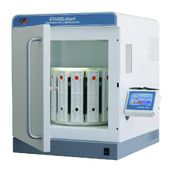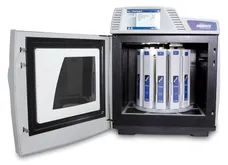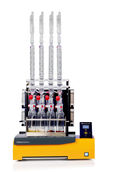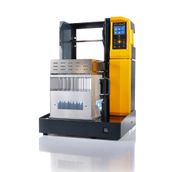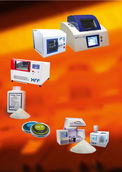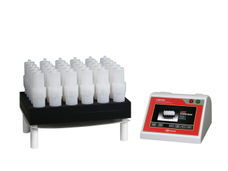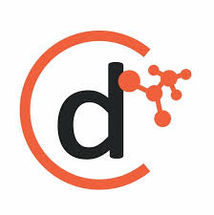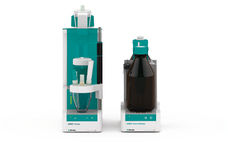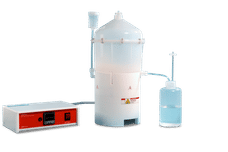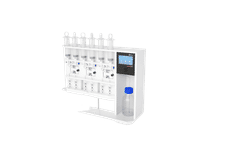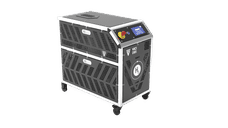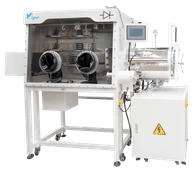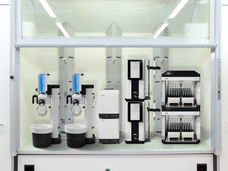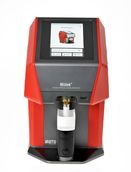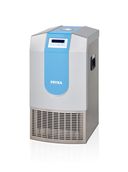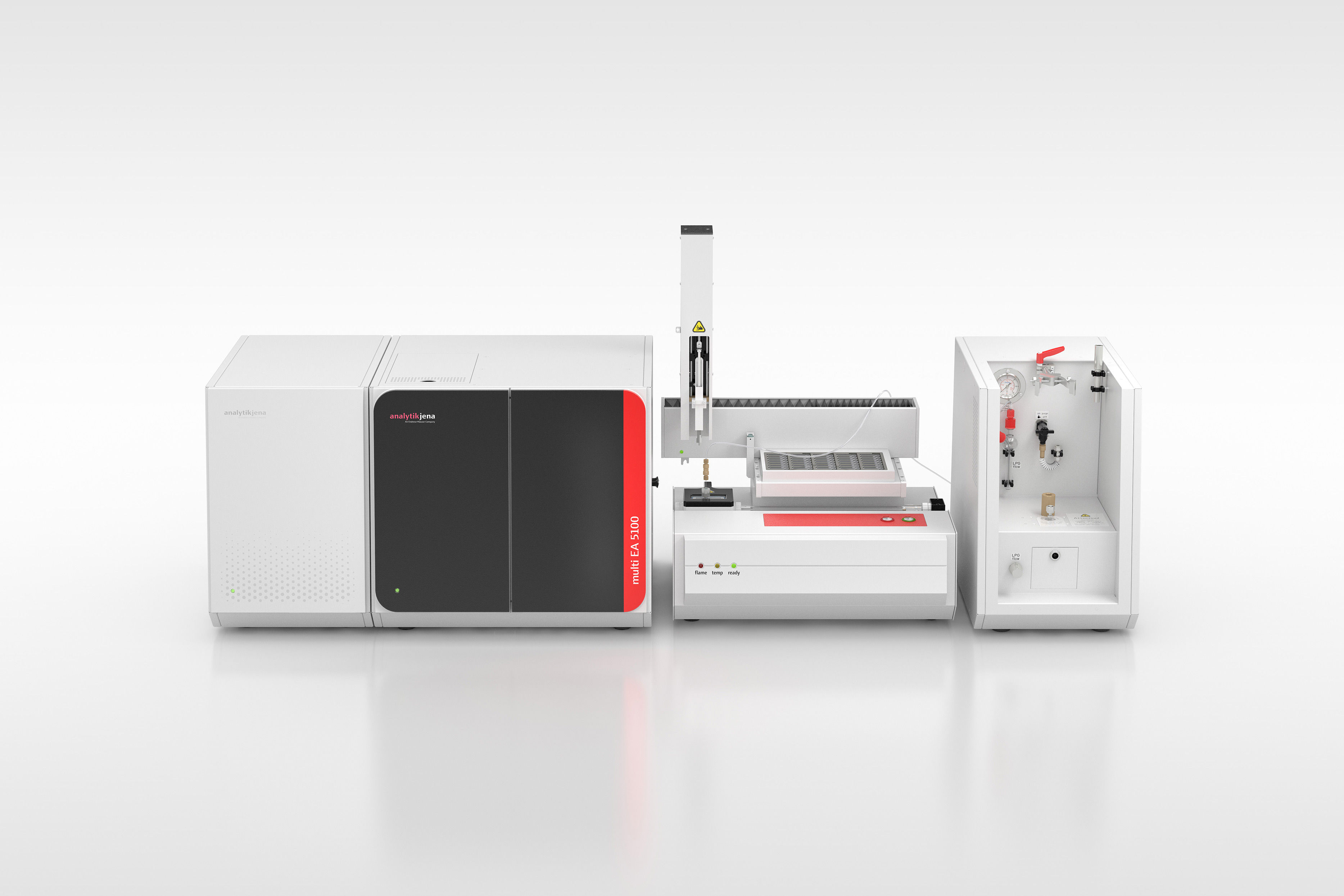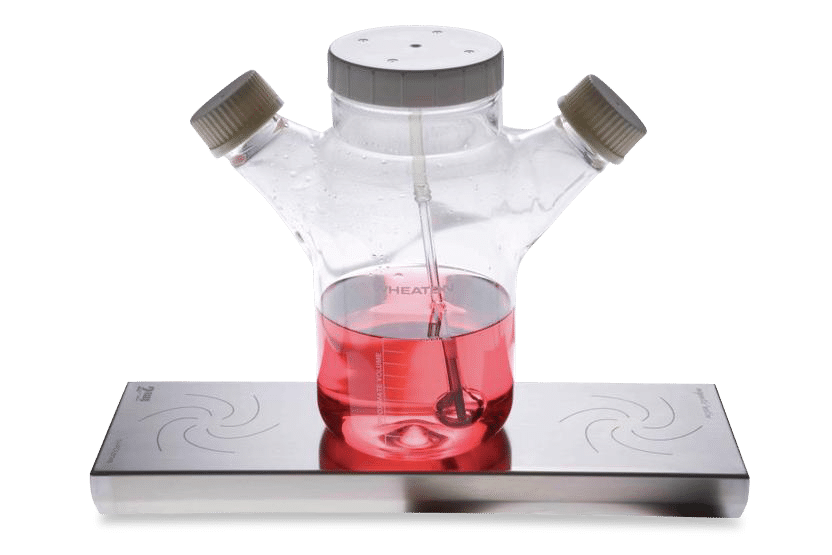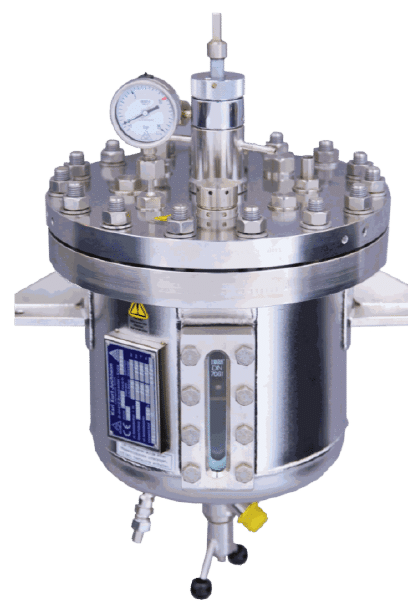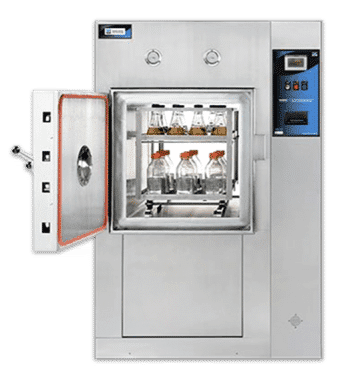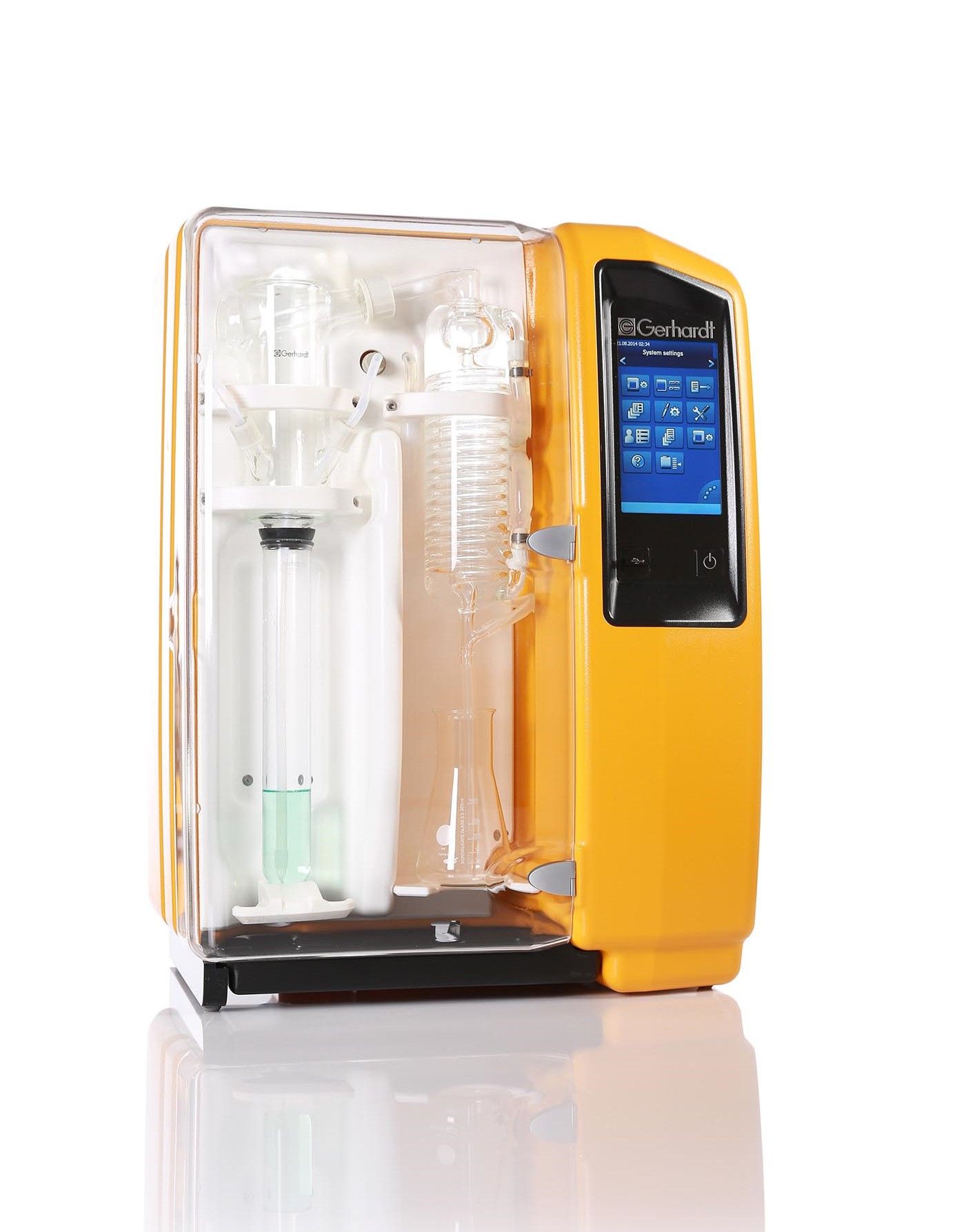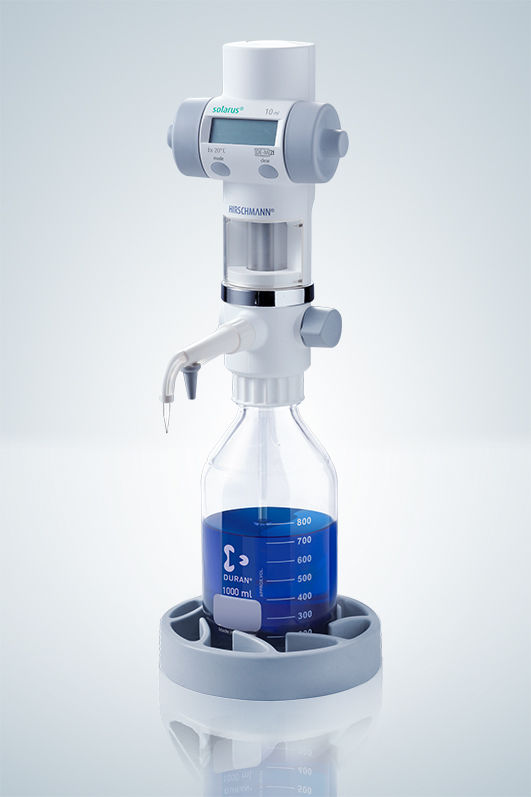Lab Equipment at a Glance: All Products and Instrument Types
The generic term "lab equipment" describes a variety of tools and instruments used in scientific and industrial laboratories to carry out precise measurements, analyses and experiments. On this page you will find an overview of products from various manufacturers.
You want to know what types of lab equipment there are? Our lab equipment directory explains all types of equipment including definition, function and application.
Lab Equipment at a Glance: All Products and Instrument Types

The generic term "lab equipment" describes a variety of tools and instruments used in scientific and industrial laboratories to carry out precise measurements, analyses and experiments. On this page you will find an overview of products from various manufacturers.
You want to know what types of lab equipment there are? Our lab equipment directory explains all types of equipment including definition, function and application.
Lab equipment at a glance
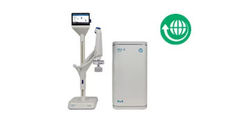
Milli-Q® IQ 7000 by Merck
An ultrapure Type 1 water purification system designed with you in mind
Consistent production of superior-quality ultrapure water
Ultrapure water from pure water ✓ Intuitive touch screen ✓ Greener Alternative Product ✓
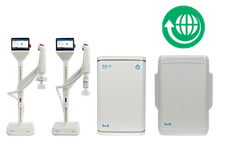
Milli-Q IQ® 7003/05/10/15 by Merck
Integrated Ultrapure & Pure Water Systems Designed to simplify your daily lab life
Ultrapure and pure water of the highest quality directly from tap water
Ultrapure & Elix pure water from tap ✓ Innovative Q-POD & E-POD dispensers ✓ Greener Alternative Products ✓
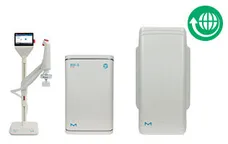
Milli-Q® IX 7003/05/10/15 by Merck
Consistent and Reliable Type 2 Pure Water Quality
Reliable Pure Type 2 Water Purification Systems for results reproducibility & Lab productivity
Constant-quality Elix pure water ✓ Mercury-free UV lamps ✓ Greener Alternative Products ✓
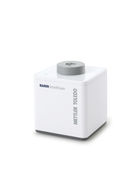
SmartCheck by Mettler-Toledo
Check Pipette Dosing Accuracy - Lightning Fast in Under a Minute
Detect dosing errors before it gets expensive
SmartCheck - the result in less than 60 seconds
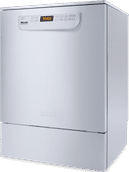
PG 85 by Miele
Powerful, safe, flexible: Compact lab washers with intelligent wash system
Developed for the reprocessing of laboratory glassware for analytical experiments
The new lab washers from Miele Professional are more powerful than ever before – and require less water, electricity and process chemicals
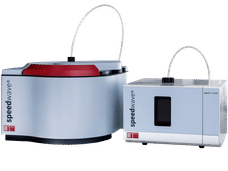
Mikrowellensystem Speedwave XTRACT / ENTRY by Berghof
Microwave sample preparation: Fast and safe
speedwave XTRACT: High efficiency and low operating costs for environmental and food analyses
High sample throughput - 32 samples in 30 minutes ✓ Low operating costs - guaranteed unsurpassed service life and warranty also on the vessels ✓ Simple, intuitive operation - No sensor connection, simply open, close and clean vessels ✓
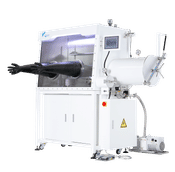
SG series by Vigor Gas Purification Technologies
Vigor SG line of glovebox systems <1ppm O2 and H2O, unrivalled leakage rate of 0.001Vol%/h
Vigor Glovebox systems are designed around your process
High end components ✓ Excellent service and after sales care ✓ Competitive on price ✓
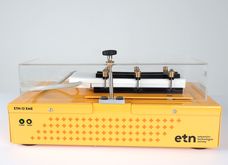
ETN-12 EME by dichrom
Revolution in sample preparation: Spotlessly clean samples without LC for direct MS analysis via EME
World premiere EME enables parallel, fast, green sample extraction from complicated matrices
ETN-12 EME is the world’s first EME device. Perfect for R&D + verification analysis ✓ EME offers fast & selective sample extraction of ionizable compounds from complex biological samples ✓ A «GREEN» sample preparation method due to low power consumption and a low need for organic solvents ✓
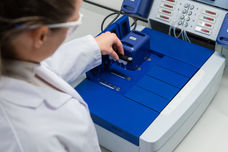
CrystalBreeder by Technobis
CrystalBreeder: the next generation multi-reactor crystallization platform
Enhance your early stage solid state screening. New: controlled evaporation & vapor diffusion modes
Multi-reactor crystallization platform for medium-throughput solid-state research ✓ Multiple crystallization modes now available ✓ Minimal sample required ✓

Crystalline PV/RR by Technobis
Crystalline PV/RR – multiple reactor system for crystallization process and formulation development
Access crystallization and formulation information at mL scale. Every picture tells your story
AI-based image analysis ✓ Improved optics with resolution of up to 0.63 microns per pixel ✓ Advanced analytical features ✓
Choose lab equipment by product category
Select lab equipment for your application
Buy lab equipment for the lab or the production process
Lab equipment directory: All types of lab equipment, simply explained
There are hundreds of types of lab equipment that are indispensable in research and industry, especially in the fields of chemistry, life sciences and food technology. They enable precise measurements, analyses and processes that are essential for validating scientific hypotheses and ensuring quality standards. In this article, we present you the most important sub-categories of lab equipment.
Lab equiment for measuring and analysis
Analyzers
Analyzers are complex laboratory devices used to determine the composition of samples. They play a central role in chemical analysis, medical diagnostics and food control. Analyzers can measure various parameters, including chemical concentrations, physical properties and biological markers. They are versatile and enable fast and accurate analysis of numerous sample types, which is particularly important in research and development. Well-known examples are elemental analyzers and particle analyzers.
Chromatographs
Chromatographs (HPLC, GC) are laboratory devices for separating and analyzing complex mixtures. High-performance liquid chromatography (HPLC) and gas chromatography (GC) are particularly widespread in the chemical and pharmaceutical industries. This type of lab equipment enables the identification and quantification of substances in a sample, which is essential for quality control and research. HPLC systems and gas chromatographs are also of great importance in environmental analysis, as they enable the monitoring of pollutants in air, water and soil.
Mass spectrometers
Mass spectrometers are laboratory devices that determine the mass and structure of molecules. They are indispensable in chemistry, biochemistry and pharmacy for analyzing molecular structures and identifying unknown substances. In the food industry, this type of lab equipment is used to detect contaminants. In addition, mass spectrometers are of central importance in proteomics and metabolomics, as they enable the analysis of complex biological samples.
Microscopes
One of the most commonly known types of lab equipment, microscopes are optical laboratory instruments used to magnify small structures. They are essential in biology and medicine for examining cell structures and microorganisms. In materials science, they help to analyze the microstructure of materials. Modern microscopes, such as electron microscopes, offer extremely high resolution and allow samples to be examined on a nanometric scale.
pH meter
Another very basic variety of lab equipment, pH meters are measuring instruments for measuring the pH value of solutions. They are widely used in chemistry and biotechnology to determine the acidity or alkalinity of a solution. This is crucial for many chemical reactions and biological processes. pH meters are also of great importance in the food industry to ensure the quality and safety of products.
Photometers
Photometers measure the intensity of light and are used in chemical analysis to determine the concentration of substances in solutions. They are widely used in water analysis and environmental research. Photometers are also important in clinical diagnostics to measure the concentration of biomarkers in blood samples.
Rheometers
Rheometers are laboratory devices for measuring the flow properties of liquids and semi-solid substances. This type of lab equipment is important in the chemical and food industries for investigating the viscosity and elastic properties of materials. Rheometers are also used in polymer research to analyze the mechanical properties of plastics.
Spectrometers
Spectrometers analyze the interaction of light with matter and are important in many areas of research and industry. They enable the qualitative and quantitative analysis of substances and are particularly indispensable in chemical and physical research. Spectrometers are also important in astronomy to determine the composition of celestial bodies.
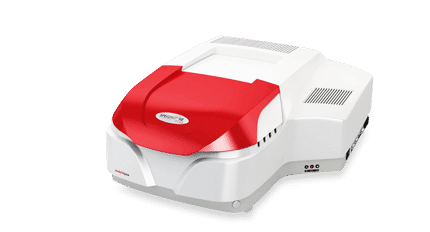
Spectrophotometers
Spectrophotometers are laboratory devices that measure the absorption spectrum of substances. They are used in biology, chemistry and medicine to determine the concentration of biomolecules, chemicals and medicines. Spectrophotometers are also of great importance in environmental analysis to monitor pollutants in water and soil.
Thermometers
A thermometer is a basic type of lab equipment/instrument for measuring temperature. They are used in almost all areas of science and industry, from monitoring chemical reactions to checking storage conditions. Thermometers are also important in the food industry to ensure compliance with cold chains and cooking processes.
Balances
Ask anyone to name a typical type of lab equipment and they are likely to say "balance". Balances are precise laboratory instruments for determining the mass of samples. They are indispensable in chemistry, pharmacy and food technology to carry out accurate measurements of reagents and samples. High-precision balances are also of great importance in materials science to determine the weight of nanomaterials.
Lab equipment for sample preparation
Homogenizers
There are many types of lab equipment that are essential for sample preparation. Homogenizers are one of them. These laboratory devices are used to homogenize samples using mechanical forces. They are widely used in biology and food technology to create uniform mixtures and break up cells. Homogenizers are also important in the cosmetics industry to produce emulsions and creams.
Mixers and stirrers
Mixers and stirrers are basic laboratory equipment used in many areas of research and industry to mix and homogenize substances. They are indispensable in chemistry, biotechnology and the food industry. Different types of mixers and stirrers allow adaptation to specific applications and sample types.
Magnetic stirrers
A piece of lab equipment that technical assistents love: Magnetic stirrers are laboratory devices that use magnetic fields to move stirring bars in a solution and mix them evenly. While this is extremely useful from a practical point of view, it is also fun to watch the little stirring rod create its typical, sometimes almost hypnotic vortex. Magnetic stirrers are widely used in chemical and biological laboratories to keep solutions homogeneous. They are also indispensable in the pharmaceutical industry to bring active ingredients evenly into solution.
Mills
Mills are laboratory devices used to grind solid samples. They are particularly important in materials science and the food industry to prepare samples for analysis. Mills are also used in the pharmaceutical industry to grind active ingredients into fine powder, which improves bioavailability.
Shakers
Shakers are laboratory devices that homogenize samples by shaking. They are widely used in biotechnology and chemistry to create uniform mixtures and accelerate reactions. Shakers are also important pieces of lab equipment in microbiology, where they help evenly mix cultures and promote the growth of microorganisms.
Ultrasonic baths
The cross-over lab equipment that's also used by your favorite optrician: Ultrasonic baths use sound waves to clean and homogenize samples. They are important in chemistry and biology to bring the finest particles into suspension and to clean surfaces. Ultrasonic baths are also indispensable in the electronics industry to remove impurities from components.
Centrifuges
Centrifuges are laboratory devices that use centrifugal force to separate particles in a liquid. They are an indispensable type of lab equipment in biology and medicine for isolating cells, proteins and other molecules. Centrifuges are also used in the food industry to separate components such as fat and protein.
Reaction devices
Reactors
Reactors are specialized tyes of lab equipment used to carry out chemical reactions under controlled conditions. They are important in chemistry and biotechnology (bioreactors) to precisely control reaction parameters. Reactors are also used in polymer research to synthesize new materials.
Reaction flasks
The easily breakable lab equipment you know from school: Reaction flasks are glass vessels used to carry out chemical reactions. They are indispensable in chemistry for carrying out reactions in a safe and controlled manner. Reaction flasks are available in different sizes and shapes to allow for different reaction volumes and conditions.
Rotary evaporators
Rotary evaporators are laboratory devices used to remove solvents under vacuum. They are important in chemistry and pharmacy to concentrate solutions and isolate reaction products. Rotary evaporators are also important in the food industry for obtaining flavors and extracts.
Heating stirrers
Heating stirrers combine the functions of stirring and heating samples. They are indispensable in many laboratories to ensure homogeneous mixtures and constant reaction conditions. These laboratory devices are particularly useful in synthetic chemistry to heat and stir reactions uniformly.
Lab equipment for heating and cooling
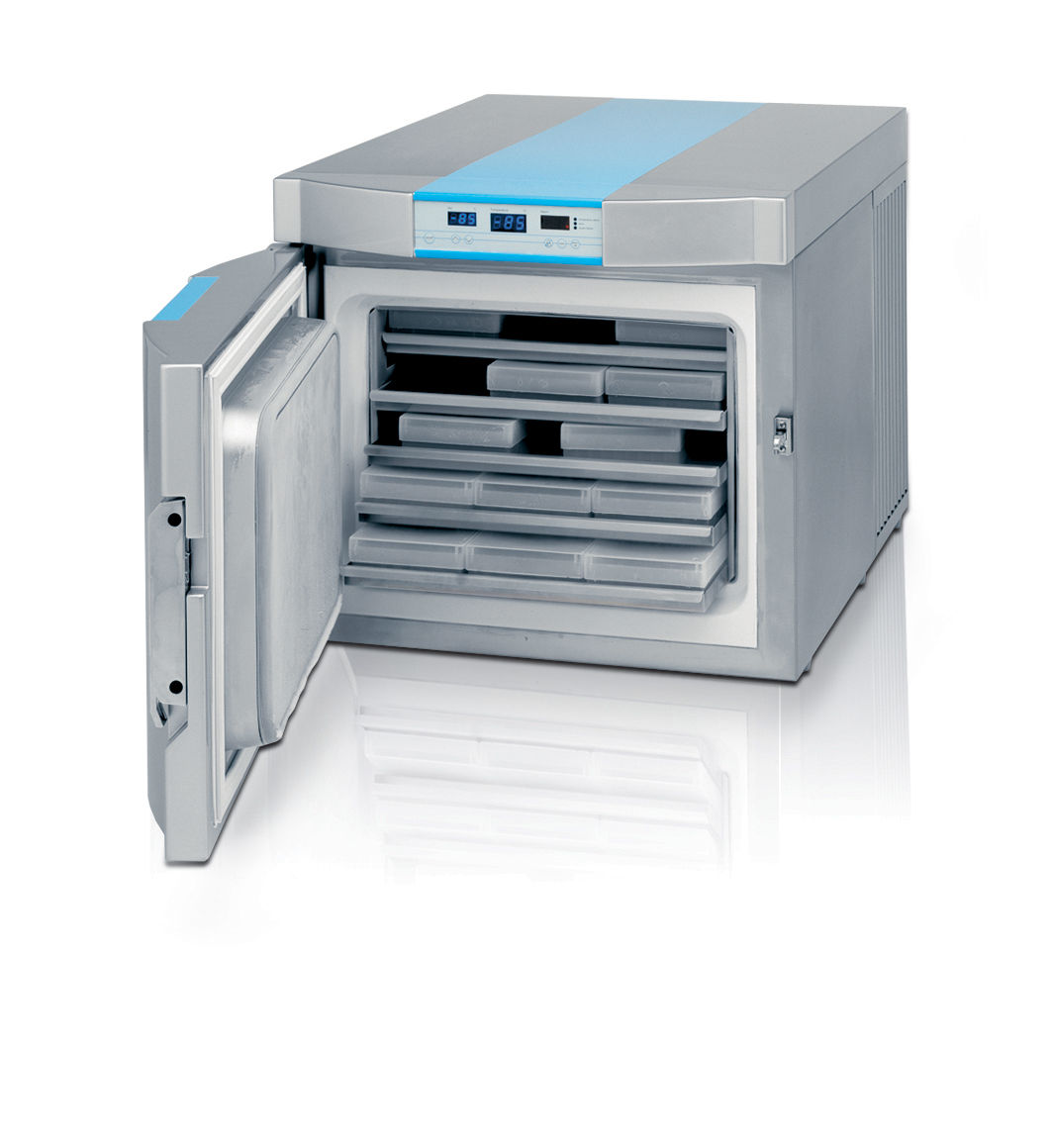
Freezers
Freezers are laboratory devices used to store samples at low temperatures. They are important in biology and medicine to preserve sensitive samples and reagents. Freezers are also used in the food industry to store products and extend their shelf life.
Heating and water baths
Heating or water baths are lab equipment devices used to heat samples in a bed of water or oil. They are important in chemistry and biology to ensure constant temperatures for reactions and incubations. Heating baths are also important in food technology to control the processing temperatures of food.
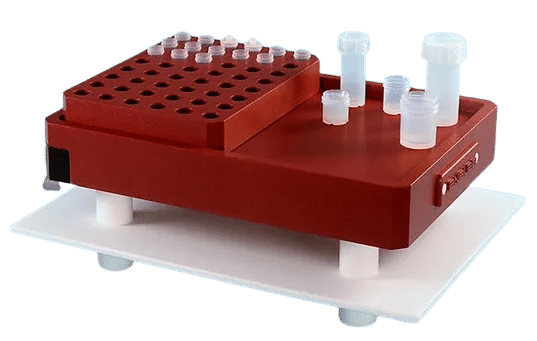
Heating plates
This type of lab equipment is used–you guessed it–to heat samples. Heating plates (or hotplates) are widely used in chemical and biological laboratories to speed up reactions and bring samples to a constant temperature. Hot plates are also important in metallurgy to heat and process materials.
Cryogenic storage
Cryogenic storage includes lab equipment that uses extremely low temperatures to preserve samples. They are indispensable in biotechnology and medicine for the long-term storage of cells and tissue. Cryogenic storage is also important in physics and materials science to preserve samples under stable conditions.
Refrigerators
Refrigerators are basic lab equipment for storing samples at low temperatures. They are important in all areas of science and industry to preserve samples and reagents. Refrigerators are also used in clinical research to store drugs and biological samples.
Cooling circuits
Cooling circuits are lab equipment used to cool samples and reactions. They are important in chemistry and biotechnology to control exothermic reactions and protect sensitive samples. Cooling circuits are also important in the semiconductor industry to keep production processes stable.
Ovens
Ovens are lab equipment used for drying and curing samples. They are essential in materials science and chemistry to treat samples at high temperatures. Ovens are also important in the ceramics and glass industries for firing and hardening materials.
Lab equipment for sterilization and cleaning
Autoclaves
Autoclaves (also known as steam sterilizers) are laboratory devices used to sterilize materials at high pressure and temperature. This particular item of lab equipment is indispensable in microbiology and medicine to kill germs and create sterile conditions. Autoclaves are also used in the pharmaceutical industry to produce sterile medicines and medical devices. In addition, autoclaves are also used in industry for the production of composite materials or the thermal treatment of building materials.
Disinfection devices
Disinfection devices are laboratory devices that are used to kill germs and clean surfaces. They are indispensable in medicine and biotechnology to ensure sterile working conditions. Disinfection devices are also important in the food industry to ensure the hygiene of production facilities.
Cleaning systems
Cleaning systems include laboratory equipment used to clean glassware and instruments. They are important in chemical and biological laboratories to prevent contamination and ensure accurate results. Cleaning systems are also essential in pharmaceutical production to ensure the purity of products.
Sterilizers
Sterilizers are laboratory devices used to sterilize instruments and materials. They are indispensable in microbiology and medicine to create sterile conditions. Sterilizers are also important in the cosmetics industry to ensure the safety and quality of products.
Safety and protective lab equipment
Fume hoods
Fume hoods are laboratory devices that extract harmful vapors and gases. They are indispensable in chemistry and biology to ensure the safety of laboratory workers. Fume hoods and extractor hoods are also important in the pharmaceutical industry to minimize exposure to hazardous substances.
Eye showers and safety showers
Eyewashes and safety showers are safety-oriented types of lab equipment used for rapid decontamination in the event of accidents. They are important in all laboratories to minimize injuries from chemical substances. Eye showers and safety showers are also essential in industry to enable a rapid response in an emergency.
First aid lab equipment
First aid equipment includes lab equipment and materials used to treat injuries and accidents. It is necessary in all laboratories in order to be able to react quickly in an emergency. First aid equipment is also essential in industry and educational institutions to ensure the safety of staff and students.
Safety goggles
Safety goggles and gloves are personal protective equipment that protect laboratory workers from chemical, biological and physical hazards. They are essential in all scientific and industrial laboratories. Safety eyewear and gloves are also important in manufacturing and construction to ensure the safety of workers.
Lab equipment for sample preparation
Distillation units
Distillation units are lab equipment used to separate liquid mixtures by distillation. They are important in the chemical and food industries to obtain pure substances. Distillation units are also essential in the pharmaceutical industry to purify and concentrate active ingredients.
Distillation systems
Distillation systems are smaller laboratory devices that are used to carry out distillations. They are indispensable in chemical research and the production of reagents. Distillation devices are also important in environmental analysis to check the purity of water and air samples.
Extractors
Extractors are laboratory devices used to isolate substances from samples. They are important in chemistry and biology to obtain specific components from complex mixtures. Extractors are also indispensable in the food industry to isolate flavors and active ingredients.
Filtration systems
Filtration systems are laboratory devices used to separate solids and liquids. This lab equipment is important in chemistry and biotechnology to obtain pure solutions and remove impurities. Filtration systems are also essential in water treatment to ensure clean drinking water.
Lab equipment for volume measurement
Burettes
Burettes are laboratory devices for the precise measurement and dosing of liquids. They are indispensable in chemical analysis and titrations to determine precise quantities. Burettes are also important in educational research to teach students the precise handling of liquids.
Volumetric flasks
Volumetric flasks are glass vessels used for the precise preparation of solutions. They are important in chemistry and biology to ensure accurate concentrations. Volumetric flasks are also essential in environmental research to prepare standard solutions for analyzing environmental samples.
Measuring cylinders
Graduated cylinders are laboratory instruments used to measure liquid volumes. They are indispensable in all scientific and industrial laboratories. Measuring cylinders are also important in quality control to check the exact volumes of products and solutions.
Pipettes and dispensers
Pipettes and dispensers are laboratory devices for accurately dosing small volumes of liquids. They are indispensable in chemistry, biology and medicine for carrying out precise measurements. Pipettes and dispensers are also important in diagnostics to prepare samples for tests and analyses.
Titrators
Titrators are laboratory devices for carrying out titrations. They are important in chemical analysis in order to carry out precise concentration determinations. Titrators are also essential in the food industry to determine the acidity and other chemical properties of products.
Lab equipment: the working basis for millions of specialists
Lab equipment is the basis for precise scientific and industrial work. These types of laboratory products enable millions of researchers and technicians around the world to carry out precise measurements and analyses, prepare samples and control reactions under controlled conditions. In the chemical, life sciences and food technology industries, they are indispensable for ensuring the quality and safety of products. Careful selection and use of the right lab equipment is therefore crucial for the success of scientific and industrial projects.
Haven't found the right product yet?
The chemeurope.com Product Search
Start your targeted search now with a wide selection of filter options. Here you can easily find the right product for your search, including manufacturer information and options for requesting a quote or downloading the corresponding brochure.

